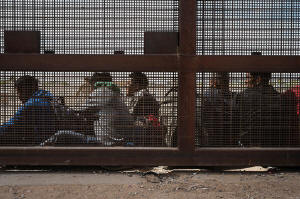US appeals court appears divided over Texas border enforcement law
 Send a link to a friend
Send a link to a friend
 [March 21, 2024]
By Daniel Wiessner [March 21, 2024]
By Daniel Wiessner
(Reuters) -A U.S. appeals court panel on Wednesday seemed divided over
whether to continue blocking a Republican-backed Texas law that would
empower state authorities to arrest and prosecute migrants and asylum
seekers suspected of illegally crossing the U.S.-Mexico border.
A three-judge panel of the New Orleans-based 5th U.S. Circuit Court of
Appeals is considering whether to allow the law known as S.B. 4 to take
effect while the state appeals a judge's ruling that prevented it from
being enforced pending the outcome of a challenge by the administration
of Democratic President Joe Biden and civil rights groups.
S.B. 4 would make it a state crime to illegally enter or re-enter Texas
from a foreign country and would allow state judges to order that
violators leave the United States, with prison sentences up to 20 years
for those who refuse to comply. Critics of the measure point out that
migrants who cross the border can already be charged with illegal entry
or re-entry under federal laws and immigrant advocates say a state law
could fuel racial profiling.
The two judges who spoke during Wednesday's hour-long arguments split
sharply over whether S.B. 4 improperly interferes with the federal
government's enforcement of U.S. immigration law as the Biden
administration claims.
Circuit Judge Priscilla Richman noted that no other state has claimed
the right to remove people in the country illegally, suggesting that
S.B.4's novelty may be enough to temporarily stop it from being
enforced.
"This is not a power that has been exercised historically by states,"
Richman, an appointee of Republican former President George W. Bush,
told Aaron Nielson, a lawyer for the state.
Nielson seemed to struggle to answer Richman's repeated questions about
how the law would work in practice and not impede federal immigration
officials. He maintained that S.B. 4 mirrors federal law making it a
crime to illegally enter the United States, and that the state's ability
to arrest migrants falls within its traditional powers to ensure public
safety.
"Texas has a right to defend itself," he said.
Circuit Judge Andrew Oldham, an appointee of Republican former President
Donald Trump, said he was skeptical the Biden administration could show
that the entire law was likely invalid, which is required to continue to
block it while the court considers the merits of the legal challenge.
“When it comes to who gets to be in the United States, that’s
exclusively federal. But that’s not what we’re talking about,” Oldham
said to Daniel Tenny of the U.S. Department of Justice, who represents
the Biden administration.
Oldham was previously general counsel to Republican Texas Governor Greg
Abbott, who has repeatedly clashed with the Biden administration over
border policies.
Tenny in response to Oldham said that the entire law interferes with
federal enforcement, and added that the 5th Circuit could narrow the
block on the law to specific provisions that it finds problematic.

[to top of second column]
|

A group of migrants sit as they wait to be transported for
processing on the day the U.S. 5th Circuit Court of Appeals hears
oral arguments on Texas' motion to lift a block on its SB4
immigration law that would allow state officials to arrest migrants
suspected of being in the country illegally, in El Paso, Texas, U.S.
March 20, 2024

The panel includes Circuit Judge Irma Carrillo Ramirez, a Biden
appointee who did not speak during the arguments.
LEGAL BATTLES
The 5th Circuit had initially paused the ruling blocking S.B. 4 and
the U.S. Supreme Court upheld that decision on Tuesday, briefly
allowing Texas to enforce the law. But in an unusual move hours
later the 5th Circuit panel scheduled an emergency hearing for
Wednesday and reversed its earlier ruling in a 2-1 vote, with Oldham
dissenting.
The dispute over the Texas law is one in a series of legal battles
between Republican state officials and the Biden administration over
the state's ability to police the border. Texas officials have
blamed Biden for an influx in illegal border crossings that they
have said drains states resources and threatens public safety, but
the Biden administration has said interference from Texas and other
states only compounds the problem.

In ruling to block S.B. 4 last month, U.S. District Judge David Ezra
agreed with the Biden administration that the state law was invalid
under a 2012 U.S. Supreme Court ruling involving an Arizona
immigration law that said states cannot adopt immigration
enforcement schemes that clash with federal law.
Tenny on Wednesday told the 5th Circuit that upholding S.B. 4 would
upend precedent and mean every state could adopt its own policies
that potentially clash with federal law.
“This entire scheme is exactly what the Supreme Court warned against
in Arizona,” Tenney said. “The federal government has to have
control over the immigration system.”
Tenny was joined at Wednesday's arguments by Cody Wofsy of the
American Civil Liberties Union, who told the court that an estimated
80,000 people could be arrested in Texas each year if S.B. 4 takes
effect.
"It's creating an entirely new system where people are going to be
subjected to a state-made, state-run system with no access to
federal relief" such as asylum, he said.
(Reporting by Daniel Wiessner in Albany, New York, Editing by Will
Dunham, Alexia Garamfalvi and Aurora Ellis)
[© 2024 Thomson Reuters. All rights reserved.]This material
may not be published, broadcast, rewritten or redistributed.
Thompson Reuters is solely responsible for this content. |